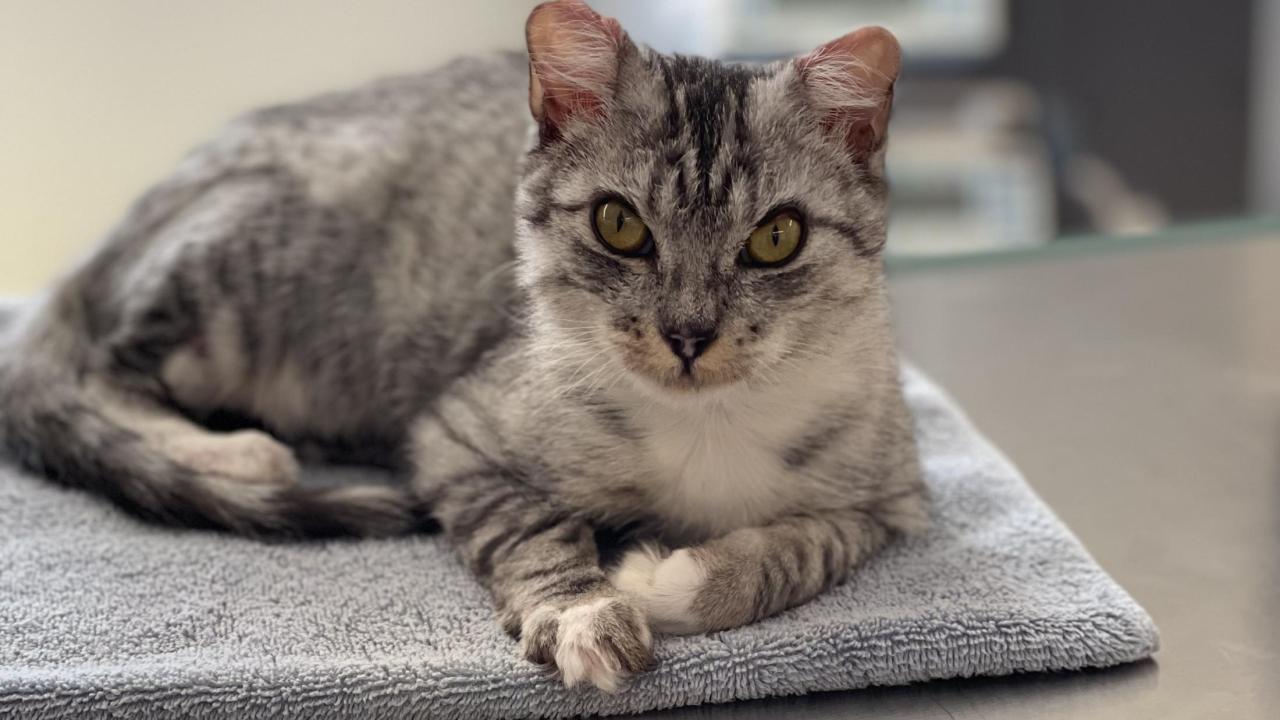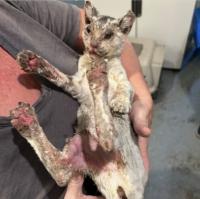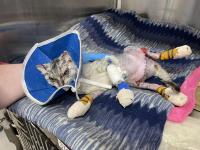
Burned Kitten Completes Month of Care to Make Full Recovery
“Case of the Month” – November 2023

Hundreds of animals throughout California have benefitted from the Access To Care (ATC) Program at UC Davis. Established to provide veterinary care through community partnerships for shelters and rescues, as well as underserved areas of Northern California, ATC provides a tremendous amount of hands-on training for veterinary students seeking extra-curricular projects.
While the circumstance surrounding it are unfortunate, one of the most valuable aspects of ATC is the experience students can gain while treating burned animals – a level of education that is not often seen in many veterinary schools due to the rarity of the injuries.
Such is the case with the care of Makenna, an approximate 6-month-old kitten brought to the FieldHaven Feline Center by a Good Samaritan after suffering severe burns of unknown origin. FieldHaven has been a great partner to UC Davis for the past decade, presenting many other ATC and specialty service patients, as well as clinical trials participants.
By the time she arrived at the UC Davis veterinary hospital 3-5 days after the burns occurred, the veterinarians estimate, some of Makenna’s burned tissue has already started to scar, restricting the movement of her back legs and adding another level of complication to her care. But the specialists at UC Davis were well prepared to save her, having treated hundreds of burned animals over just the past few years due to persistent California wildfires. In fact, care of burned animals was a specifically designated aspect of ATC when it was first developed.

Upon initial admittance to the Emergency Room, Makenna was seen by a team of students, interns, and residents, led by faculty members and critical care specialists Drs. Kate Hopper and Steve Epstein. They began treating the third degree burns on her head, abdomen, and all four limbs and feet. After sedating her and administering pain medications, her wounds were clipped and cleaned, and large areas of dead tissue were removed. She was soaked in a diluted antiseptic and disinfectant bath to soften the already crusting tissue and to help clean the wounds. Thankfully, her eyes seemed to have escaped injury and there appeared to be no signs of smoke inhalation.
One of the first veterinarians to care for Makenna was Dr. Ardi Moussavi, who had recently completed his Master of Preventive Veterinary Medicine degree at UC Davis and was shadowing the team in the ER/ICU. (He hopes to stay on at UC Davis and has applied for a residency training program.)
“I was involved in Makenna's care from the beginning,” said Dr. Moussavi. “She required surgery, daily bandage changes, and various treatments, so I was pleased my veterinary background equipped me to provide help to the amazing UC Davis team.”
Dr. Moussavi felt such a strong connection to Makenna that he decided to foster her while she completed her extensive treatments.

The following day, Makenna’s care was transferred to ATC under the guidance of Drs. Karen Vernau and Elizabeth Montgomery. The faculty members, along with DVM students and hospital veterinary technicians, began the daily maintenance of her injuries, which involved cleaning and medicating the wounds, as well as bandage changes.
Two weeks after admittance, Makenna required surgery on the scarred tissue area of her abdomen that restricted the movement of her rear limbs. Faculty surgeon Dr. Phillip Mayhew and surgical resident Dr. Sohee Bae of the Soft Tissue Surgery Service removed the scar tissue and reconstructed the affected area, allowing free movement of her back legs.
Dr. Moussavi reported that she recovered well from the surgery and was walking in her foster home with a much better range of motion in her pelvic limbs than she had before the surgery.
Makenna’s burns gradually healed over the next month until she was healthy enough for veterinary students on rotation in the Community Surgery Service to spay her under the guidance of Dr. Montgomery.
After nearly two months of care, Makenna fully recovered from her burns, and is ready for adoption. There are already two people who have applied to provide her with a forever home – a friend of Dr. Moussavi, as well as a UC Davis veterinary hospital employee.
# # #
Funding for Makenna’s care was provided by the school’s Veterinary Catastrophic Need Fund, which provides medical treatments for animals that are injured in wildfires, natural disasters, or other accidents. Thanks to the generosity of many donors over the years, the fund has provided care for hundreds of domestic animals and livestock burned in California wildfires. Please consider helping to continue this legacy of compassionate care at UC Davis.
